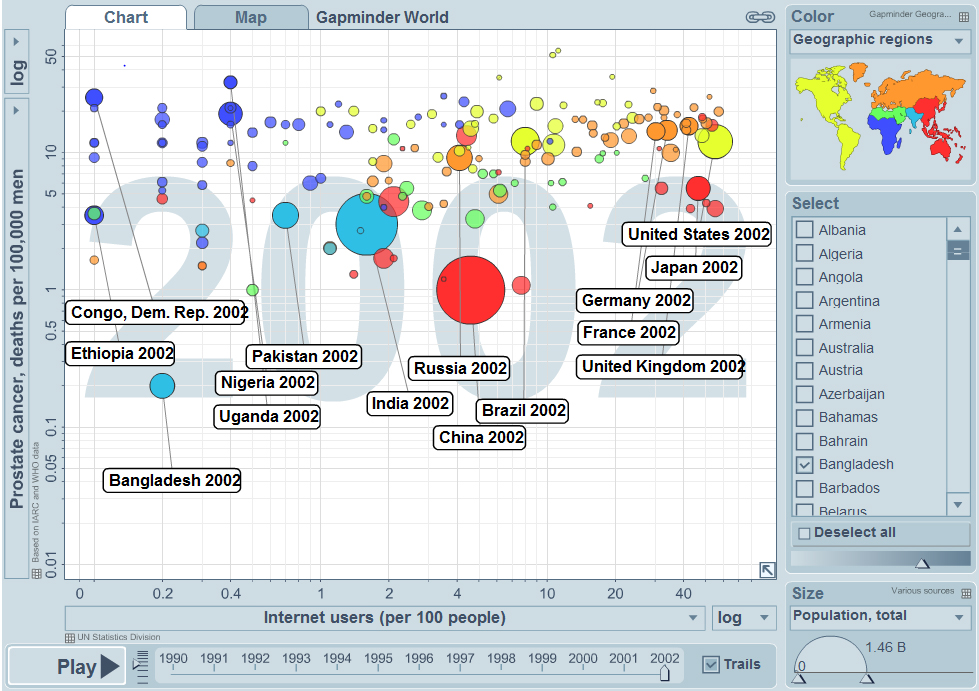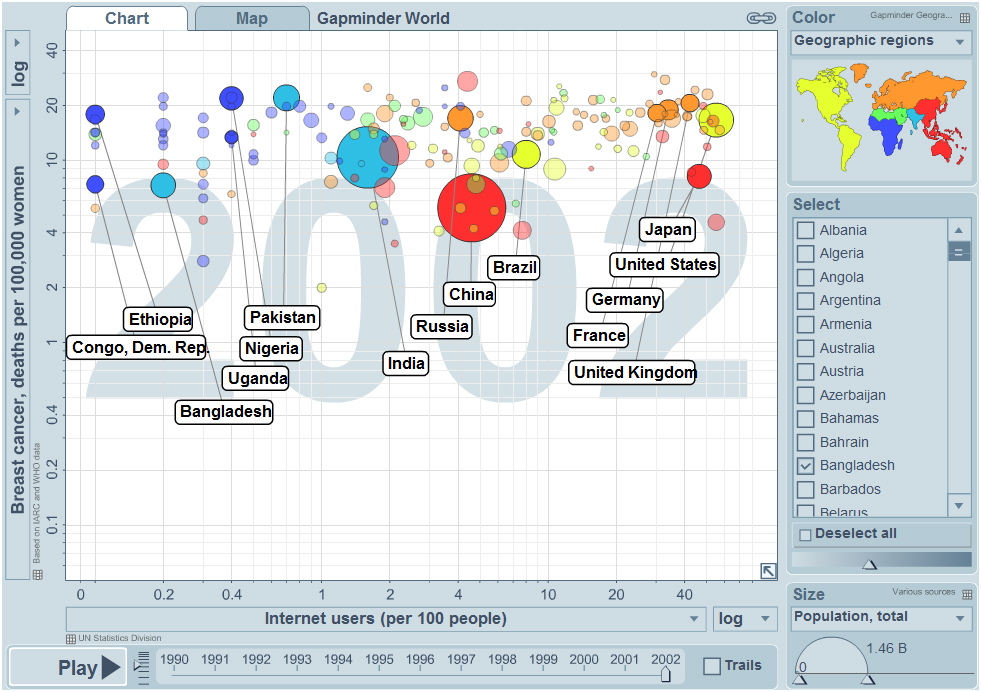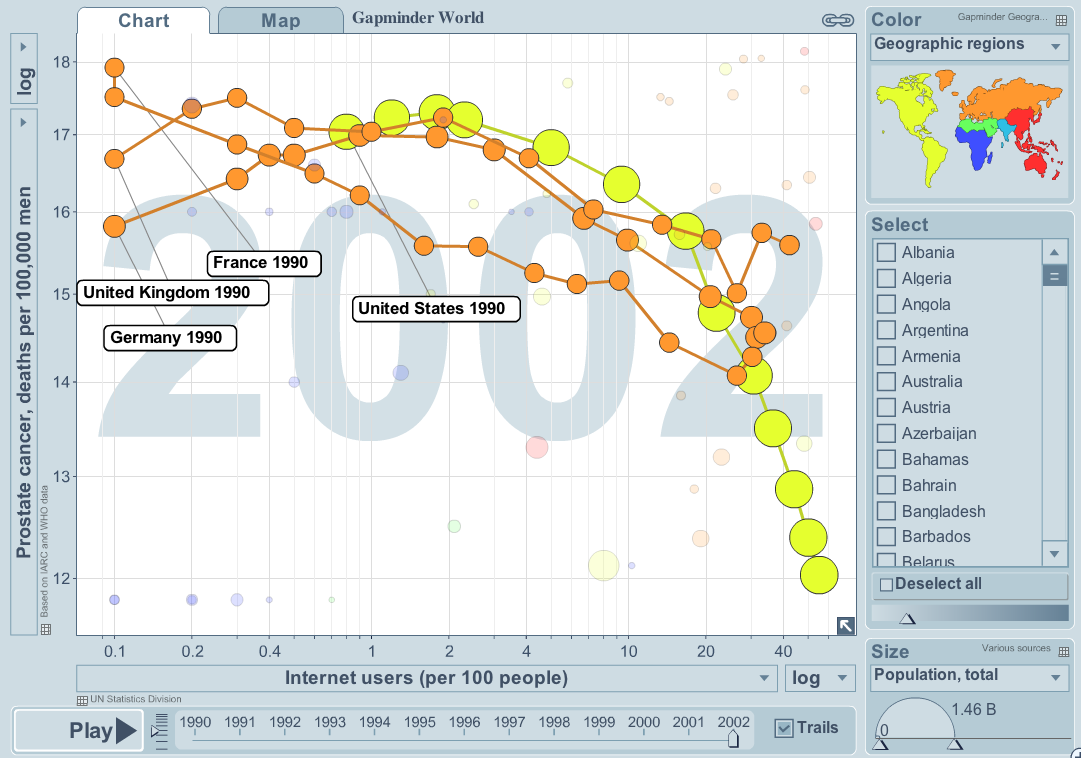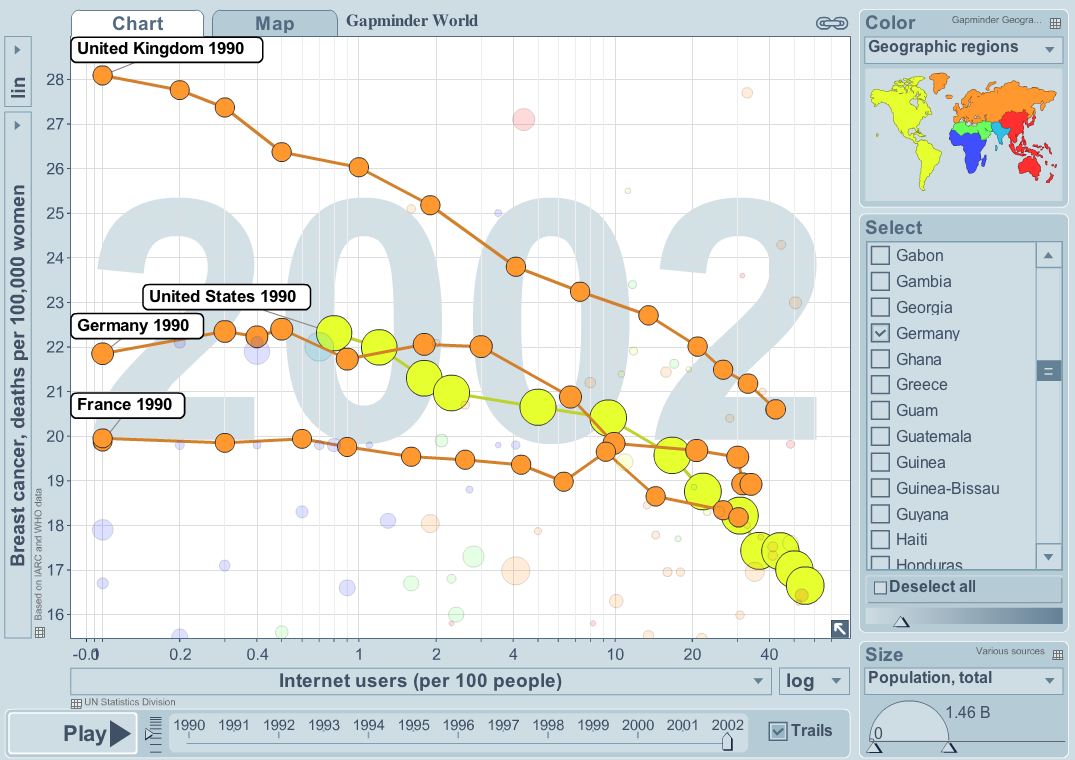By Antonio A. Casilli (Centre Edgar-Morin, EHESS, Paris)
After putting online a post that satirized an article claiming that electronic media give cancer recently published by Aric Sigman in The Biologist (2009), I’ve undergone a phase of serious self-criticism. Sure, I was in fierce disagreement with the author. But the general tone of my post was un-academic and rude. Ad hominem attacks really don’t belong in science. Turns out I am a dismissive prick. What do you know? 😀
So I decided to make it right by you folks, and to hone my argument by providing evidence – hard fact-based scientific evidence. I did it like any other scientist would, by collecting a bunch of data, tinkering with them a little, cherry-picking something, hiding something else, and wrapping everything up in fancy graphics! What did I get at the end of the day? A revolutionary discovery: not only Internet does not give cancer, it actually cures it!
How did I come up with such a sensational breakthrough? First, I took a random data set from the United Nations Statistics Division. Then I arbitrarily decided that Internet access would be an accurate proxy for actual Internet use. So I asked myself the following question: do countries that are more connected (in terms of percentage of people having Internet access) have a higher number of deaths for two common types of cancer – breast for the ladies, prostate for the gents? For the sake of completeness, I focused on 2002 (because data were not available for several countries before that year). I put everything in my statistical blender, and this is what I obtained:

Roughly, we have three groups of countries (from right to left): developed, emerging and developing ones. In developed countries, up to 55% of the population has access to Internet (e.g. USA). In developing countries the percentage drops dramatically to O.1% (e.g. Congo). And yet in the former, mortality rate is .012%, while in the latter it’s a stunning .025%!
The quest for a positive correlation between cancer deaths and Internet use leads to the same kind of disappointing results in the case of breast cancer.

I spare you the waste of time of drawing a line of best fit. Take my word: despite some problematic cases, like Bangladesh (but we can agree that we’re dealing with an outlier here), there’s no correlation. I think we have to surrender to the obvious: Internet is not carcinogenic. If you live in a less connected country, that doesn’t mean you’re less likely to die of cancer. Conversely, the fact of living in a highly connected country doesn’t seem to increase your chances of passing away of the Big C.
Interestingly, countries who are better off in terms of cancer mortality rate belong to the second group: emerging countries with moderate connectivity (Brazil, Russia, China, and India). Good news: they account for almost half the population of the planet. Probably, income plays a part in it, and access to environmental resources, and public health policies but… hey, who am I to discuss economic divides in globalization? We’re talking medicine here. And technology. Serious shit.
So let’s leave these factors aside, and let’s stick to the point. Let’s do it like any educated individual would: by focussing exclusively on Western countries. And that’s where things get interesting. Let’s look at four representative countries (I guess representative of my own personal preferences when it comes to cool places): Germany, France, UK and USA. And let’s examine time series for the correlation, from 1990 to 2002 – i.e. the years of the big Internet boom. And what do we see? That the more Internet kicks in, the more cancer looses ground. There is a strong negative correlation: Internet is beating cancer!

Pretty much the same thing for breast cancer. Negative correlation, this time weak but verging on strong.

Now, I know what you are thinking: “Wait a minute! Your entire argument is full of holes! After all, in the period 1990-2002 there has been a huge increase in cancer research, fundraising and information campaigns for screening and early detection. The correlation you establish between the rise of the Internet and the decline of cancer mortality is fake like a three dollar bill with the face of George W. Bush on it!”
I hear you. And I sure agree that the 1990s have been the years of cancer awareness campaigns, but I don’t believe that the correlation is spurious. In the same years, within the countries examined here, Internet has played a role in coordinating self-help groups (Briceño & al. 2008), has given local associations a powerful tool for lobbying and raising public visibility (Waters, 2007), has proven effective in fundraising for cancer research (Goecks, 2008), has provided cancer patients with support and information thus improving their quality of life and often challenging medical negligence (Orgad, 2005; Kirschning & von Kardorff, 2008).
At the very least, the negative correlation between cancer mortality and Internet connectivity highlighted here should lead us to ask the question whether information and communication technologies have played a role in bringing down the body bag count.
Sorry for finishing on a serious note. Turns out I’m a total killjoy prick, too! 😀
A Briceño, M Gospodarowicz & A Jadad (2008) Fighting cancer with the internet and social networking. The Lancet Oncology, 9 (11): 1037-1038
J Goecks, A Voida, S Voida & ED Mynatt 2008 Charitable technologies: opportunities for collaborative computing in nonprofit fundraising. Computer Supported Cooperative Work Proceedings of the ACM 2008 conference on Computer supported cooperative work, San Diego, CA: 689-698
S Kirschning & E von Kardorff 2008 The use of the Internet by women with breast cancer and men with prostate cancer-results of online research. Journal of Public Health, 16 (2): 133-143
S Orgad (2005) The transformative potential of online communication: the case of breast cancer patients’ internet spaces. Feminist media studies, 5 (2): 141-161.
A Sigman (2009) Well Connected?: The Biological Implications of ‘Social Networking’. The Biologist, 56 (1): 14-20.
R D Waters 2007 Nonprofit organizations’ use of the internet: A content analysis of communication trends on the internet sites of the philanthropy 400. Nonprofit Management and Leadership, 18 (1): 59-76